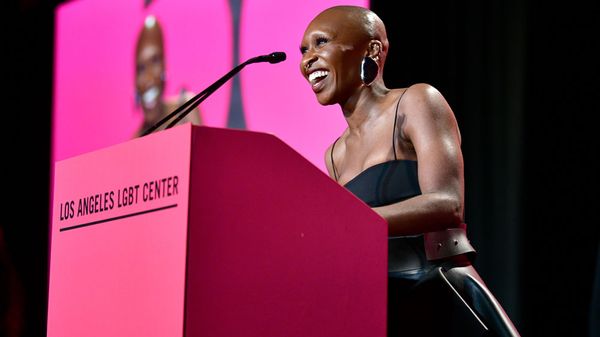August 14, 2011
Porgy, Bess, Diane and Steve
Robert Nesti READ TIME: 15 MIN.
It isn't often that Stephen Sondheim weighs in on the current state of the musical theater. So when he does, it makes headlines. Such was the case this past week when he commented in a letter to the New York Times on the upcoming production of "Porgy and Bess" that begins previews this week at the American Repertory Theater in Cambridge, MA. or rather "The Gershwins' Porgy and Bess" as it has been renamed by the creative team behind the revival that's been authorized by the Gershwin estate. Sondheim thinks highly of the opera and casts a withering eye at what's transpiring at the ART. Are the production's director Diane Paulus and librettists Susan Lori-Parks and Diedre L. Murray tampering with greatness? Is this glorious hybrid of opera and Broadway beyond tampering?
It certainly hasn't been over its long history that began in 1935 when it opened not at the Metropolitan Opera, as Gershwin initially wanted, but at Broadway's Alvin Theatre, which had been the home to his "Girl Crazy" five years before. The decision to open the show (under the auspices of the Theater Guild) in a Broadway house blurred the public's understanding of the work, which was considered so indefinable that the New York press sent both its drama and music critics to assess it. But even as some called it a glorified musical and others felt it opera-lite, it couldn't be pigeonholed. It was also of socio-culturally daring - an opera about poor blacks living in South Carolina written by enormously successful white New Yorkers (George and Ira Gershwin and the husband and wife team of Dubose and Dorothy Heyward). How could they relate to the day-to-day life of the residents of Catfish Row?
Concept raised eyebrows
That has long been the most vexing aspect to "Porgy and Bess," and one that has appeared to enter the fray in the debate, which crept up like an August storm, that's been raging in the pages of the Times. On one side is the ART team that, under the auspices of the Gershwin estate, are de-constructing the work, rendering it more a musical than an opera and bringing to it more social insight. The prime mover in this group is Paulus, the American Repertory Theater's artistic director, who is staging the new production that moves from Cambridge to Broadway for a January 2012 opening. Her concept is to make "Porgy and Bess" more accessible to today's audiences, and to do so she has hired Pulitzer Prize-winning playwright Parks (along with Murray) to rework the libretto and one of the musical theater's reigning stars Audra MacDonald to play Bess, along with Broadway actor Norm Lewis as Porgy.
When the project was announced last April, it raised some eyebrows, mainly amongst purists who wondered what's the point of tampering with a 76-year old work that has found its place in the operatic repertory. Its long-standing identity crisis (is it a musical or an opera?) appeared to be settled in the 1970s when the first complete recording of the score was released, quickly followed by an outstanding production by the Houston Grand Opera that took New York and the country by storm. In 1986, "Porgy and Bess" received its ultimate validation - a place in the repertory of the Metropolitan Opera. "If I am successful it will resemble a combination of the drama and romance of 'Carmen' and the beauty of 'Meistersinger,'" the composer said at the time of the opera's premiere - a quote that many felt showed his hubris at suggesting he could write serious opera.
Cardboard characters?
Now that it has respectability as an opera, is it heresy to suggest that "Porgy and Bess" could succeed as a commercial musical? Sure, other Gershwin shows have been reworked for contemporary audiences ("Funny Face" into "My One And Only," "Girl Crazy" into "Crazy for You"). Operas, too, have been turned into musicals - "Carmen" became "Carmen Jones" and "La Boheme" makes up the plot to "Rent;" and "Porgy and Bess" has, after all, some of the most gorgeous vocal writing ever put onto a stage and a dramatically viable story. Can a parsed version compete with missionary Mormons and "Spiderman" for the Broadway theatergoers' dollars?
It was tried once before - five years ago in London when Trevor Nunn, the British director behind "Cats" and "Les Miserables", staged a version in London's West End that curtailed the spoken dialogue, "musicalizing" the opera in the process. Called "Porgy and Bess: The Musical," it was, like the upcoming version, authorized by the Gershwin estate. It failed to draw audiences and reviews, such as one in the Guardian by Michael Billington, suggest that perhaps Paulus and Parks are onto something. "But a great masterpiece? I don't think so. For a start, the book by Dubose and Dorothy Heyward, in attempting to capture life in the waterfront courtyard of Catfish Row, teems with more characters than it can handle. Dramatic action is also sometimes poorly motivated: the final descent of the reformed, newly maternal Bess into her old ways carries little conviction. Though it is unfair to judge a work of 1935 by the politically correct standards of today, there is a touch of white liberal patronage in the assumption that the crippled beggar, Porgy, is happy to celebrate his impoverished lot with 'I Got Plenty o' Nuttin.'"
Okay, but what of the current standoff between Sondheim and Paulus? It began in the Sunday New York Times that ran a feature on August 7 by Times reporter Patrick Healey in which Paulus, Parks and Audra McDonald, four-time Tony winner, who is playing Bess, discussed their revised version in ways that immediately invited controversy. "I imagine Gershwin purists will have their arrows in their bows, ready to shoot," said McDonald. "But the opera will always exist to be performed. What we wanted to do was a new conception that tries to deal with the holes and issues in the story that would be very, very obvious to a musical-theater audience."
Paulus weighed in that though she had loved the opera the single time she saw it, she saw issues with it dramatically. "In the opera you don't really get to know many of the characters as people, especially and most problematically Bess, who goes back and forth from Crown's woman to Porgy's woman while also addicted to drugs," she explained. "I'm sorry, but to ask an audience these days to invest three hours in a show requires having your heroine be an understandable and fully rounded character."
To "round" out the character of Bess, she brought on the Pulitzer Prize-winning Parks to work on the libretto. To this end, the team has received a nod from the Dubose and Dorothy Heyward Memorial Fund, who told the Times: "It's about balancing the original work's intentions with a story that is maybe more realistic for a present-day audience." (The Heywards are credited with the original libretto in this production.)
"I feel this work more than anything is a romance, and so I wanted to flesh out the two main characters so they are not cardboard cut-out characters," Ms. Parks told the Times. "I think that's what George Gershwin wanted, and if he had lived longer" - Gershwin died in 1937, at the age of 38 - "he would have gone back to the story of 'Porgy and Bess' and made changes, including to the ending."
An upbeat ending
Bold stuff - channeling Gershwin's intentions. Gershwin was to live just two more years after "Porgy" premiered and some have surmised that its Broadway failure led him to retreat to Hollywood where he worked on film scores with his brother Ira before his untimely death from a brain tumor. Whether or not Gershwin had planned to return to the work for revisions is largely speculative. He had other projects on his mind at the time of his death and (as far as can be determined) a revised "Porgy" wasn't one of them, though it was said that he had been pitching the opera to Hollywood for a treatment that would have, no doubt, led to some revisions.
But would he have gone so far as to give the opera a more upbeat ending or eliminate - as they are at the ART - the "goat cart" in which the crippled Porgy rides around? At the ART he will walk with a cane.
None of this sat well with Sondheim, who has on numerous occasions cited "Porgy and Bess" as his favorite work of American musical theater. On Tuesday he wrote a blistering letter to the Times about Healey's article. His first volley was aimed at the change in the title: "To begin with, the title of the show is now 'The Gershwins' Porgy and Bess.' I assume that's in case anyone was worried it was the Rodgers and Hart 'Porgy and Bess' that was coming to town. But what happened to DuBose Heyward? Most of the lyrics (and all of the good ones) are his alone ('Summertime,' 'My Man's Gone Now') or co-written with Ira Gershwin ('Bess, You Is My Woman Now'). If this billing is at the insistence of the Gershwin estate, they should be ashamed of themselves. If it's the producers' idea, it's just dumb."
Then, he continued, taking aim at Paulus, McDonald and Parks: "More dismaying is the disdain that Diane Paulus, Audra McDonald and Suzan-Lori Parks feel toward the opera itself."
As to Paulus' contention that you don't get to know the characters as people, Sondheim labeled that "willful ignorance." And continued: "These characters are as vivid as any ever created for the musical theater, as has been proved over and over in productions that may have cut some dialogue and musical passages but didn't rewrite and distort them."
He took Paulus to task for her and her team's insistence of giving the characters back stories that somehow explain them more fully. "She fails to recognize that Porgy, Bess, Crown, Sportin' Life and the rest are archetypes and intended to be larger than life and that filling in 'realistic' details is likely to reduce them to line drawings. It makes you speculate about what would happen if she ever got her hands on 'Tosca' and 'Don Giovanni.' How would we get to know them? Ms. Paulus would probably want to add an aria or two to explain how Tosca got to be a star, and she would certainly want some additional material about Don Giovanni's unhappy childhood to explain what made him such an unconscionable lecher."
As for Parks' changes, Sondheim was snarky: "It's reassuring that Ms. Parks has a direct pipeline to Gershwin and is just carrying out his work for him, and that she thinks he would have taken one of the most moving moments in musical theater history - Porgy's demand, 'Bring my goat!' - and thrown it out. Ms. Parks (or Ms. Paulus) has taken away Porgy's goat cart in favor of a cane. So now he can demand, 'Bring my cane!' Perhaps someone will bring him a straw hat too, so he can buck-and-wing his way to New York.
"Or perhaps in order to have her happy ending, she'll have Bess turn around when she gets as far as Philadelphia and return to Catfish Row in time for the finale, thus saving Porgy the trouble of his heroic journey to New York. It will kill 'I'm on My Way,' but who cares?"
Kitty’s got claws
He did temper his criticism with acknowledgement that perhaps the team could succeed in their ambitious endeavor. (This is, after all, from the man who brought ambivalence into the musical theater.) "Nor am I judging this production in advance, only the attitude of its creators toward the piece and the audience. Perhaps it will be wonderful. Certainly I can think of no better Porgy than Norm Lewis nor a better Bess than Audra McDonald, whose voice is one of the glories of the American theater. Perhaps Ms. Paulus and company will have earned their arrogance."
But he concluded: "Which brings me back to my opening point. In the interest of truth in advertising, let it not be called 'The Gershwins' Porgy and Bess,' nor even 'The Gershwin-Heyward Porgy and Bess.' Advertise it honestly as 'Diane Paulus's Porgy and Bess.'And the hell with the real one."
Ouch.
Immediately the Reader's Responses piled on (nearly 500 to date), which include such insights as this one from a reader in New York: "Wow! All I can say about SS's letter is that kitty's got claws," to the well-thought from another New Yorker (James David Jacobs): "The point its authors were making in 1935 was to move opera audiences with a story about African Americans, granting them a richness of humanity and depth of emotion and experience denied them in so many other works of theater and literature of that time. What moves the audience to tears in this opera isn't the situations; it's the emotions and how they're expressed, the inner stories, the universal stories, told through music. Adding melodrama by creating back stories tells us that we shouldn't be moved by the music or the emotions; we should be moved by the situations. Diane Paulus may call me and Sondheim purists, but I call her a literalist, which is its own form of artistic fascism. She doesn't trust music to tell a story, or audience to glean meaning in purely musical terms. As Sondheim suggests, this is more about Paulus's conceptual limitations than any fault on the part of the opera's creators."
Most agreed with Sondheim and the "purists," though some point out how Sondheim has participated or sat by quietly while other radically altered his work. The film of "Sweeney Todd," which he wholeheartedly authorized, was often cited, as are John Doyle's radical interpretations of "Todd" and "Company." "Oh well," commented Steve B from Minneapolis, "even Steve Sondheim is human--contradictory, inconsistent, etc. (So maybe he's not God after all.)"
Even Diane Paulus entered the fray with diplomatic terseness. "The entire creative team and cast have the most enormous love and respect for 'Porgy and Bess,' and we are grateful for the support and encouragement we have received from the Gershwin and Heyward Estates for this production."
No doubt this controversy will help ticket sales. (Already, all previews are sold out.) And, again, draw attention to Paulus' mercurial tenure at the ART. One that has, even her detractors must admit, has revitalized the company with such original musicals as "The Blue Flower," "Johnny Baseball" and "Prometheus Bound" and hosting such companies as NYC-based Elevator Repair Service ("Gatz") and the British troupe Punchdrunk ("Sleep No More.")
Her taking over the ART has not been without issues. She came under fire in a lengthy profile in the Boston Globe a year ago for eliminating what remained of the acting company and replacing a good number of the administrative staff, many holdovers from the Robert Brustein period. "Now, she's facing the ultimate byproduct of success, a backlash. To her supporters, Paulus is a crowd-inspiring theater revolutionary. To her detractors, she is the Broadway-obsessed, box-office-driven director who has dismantled a prized institution," wrote Geoff Edgers in his Globe profile. To her credit she turned the ART's black box theater, Zero Arrow Street, into a nightclub called Oberon that hosts to this day "The Donkey Show," the disco version of "A Midsummer Night's Dream" she created with her husband Randy Weiner. The space, which for a long time lacked identity, has become one as one of the area's hippest showcases for new talents and a club venue for such performers as Lea Delaria and Justin Bond.
Most importantly, Paulus has turned the theater around financially. Wrote Edgars: "ART could not provide detailed budget figures for Paulus's first year, but Donald Ware, chairman of the board of trustees, said he expected the theater, which has a $10.9 million operating budget, to break even this year. In the previous four years, deficits ranged from $1.9 million to $665,000, according to ART producer Diane Borger. And in her first year the theater went from running in red to having profit."
And the momentum from her first season continued through her second - ART productions were, for the first time in a long time, that happy balance between artistic and commercial successes. On a cold day last February, I went to a matinee of "R. Buckminster Fuller: The History (and Mystery) of the Universe," D. W. Jacobs ' play about R. Buckminster Fuller that starred long-time ART company member Thomas Derrah and to my surprise every seat at the Loeb was filled. The same was true when I attended a new musical version of "Alice in Wonderland" (called "Alice vs. Wonderland") put on by the A.R.T. /MXAT Institute for Advanced Theater Training, the ART's acting program. The theater's revamped website and marketing campaigns, with an emphasis on social networks, also point to the theater's cutting-edge attitude. Her second ART season also brought her accolades from the Boston Theatre Critics Association (full disclosure: I am a member) with the theater winning some five Elliot Norton Awards for the theater, including one for Derrah (ironically one of the actors who was downsized) and Paulus for her direction of "Johnny Baseball" and "Prometheus Bound" (as well as the touring production of her 2009 Tony-winning Best Revival "Hair.") The company also brought Punchdrunk's "Sleep No More" to New York where it remains, next to "The Book of Mormon" the hottest show in town.
But one thing we aren't likely to see in the near future is Paulus being hired to direct a Sondheim show - but perhaps, as a friend pointed out, she can smooth things over by putting a bit of Sondheim in this "Porgy and Bess." Imagine if Bess makes a dramatic re-entry when Porgy is about to set out to find her and breaks into a new version of "I'm Still Here" with new Sondheim lyrics. He did, after all, rewrite the lyrics to "Send in the Clowns" for Barbra Streisand, perhaps he could provide this service for Ms. McDonald.
The Gershwins' Porgy and Bess runs August 17 through October 2, 2011 at the Loeb Drama Center, 64 Brattle Street, Cambridge, MA. For performance times and more information visit the American Repertory Theater website.
The Gershwins' Porgy and Bess begins previews on December 17, 2011 at the Richard Rodgers Theatre, 226 West 46th Street, New York, NY. It is to officially open on January 12, 2012 for an open-ended run.
Robert Nesti can be reached at [email protected].





